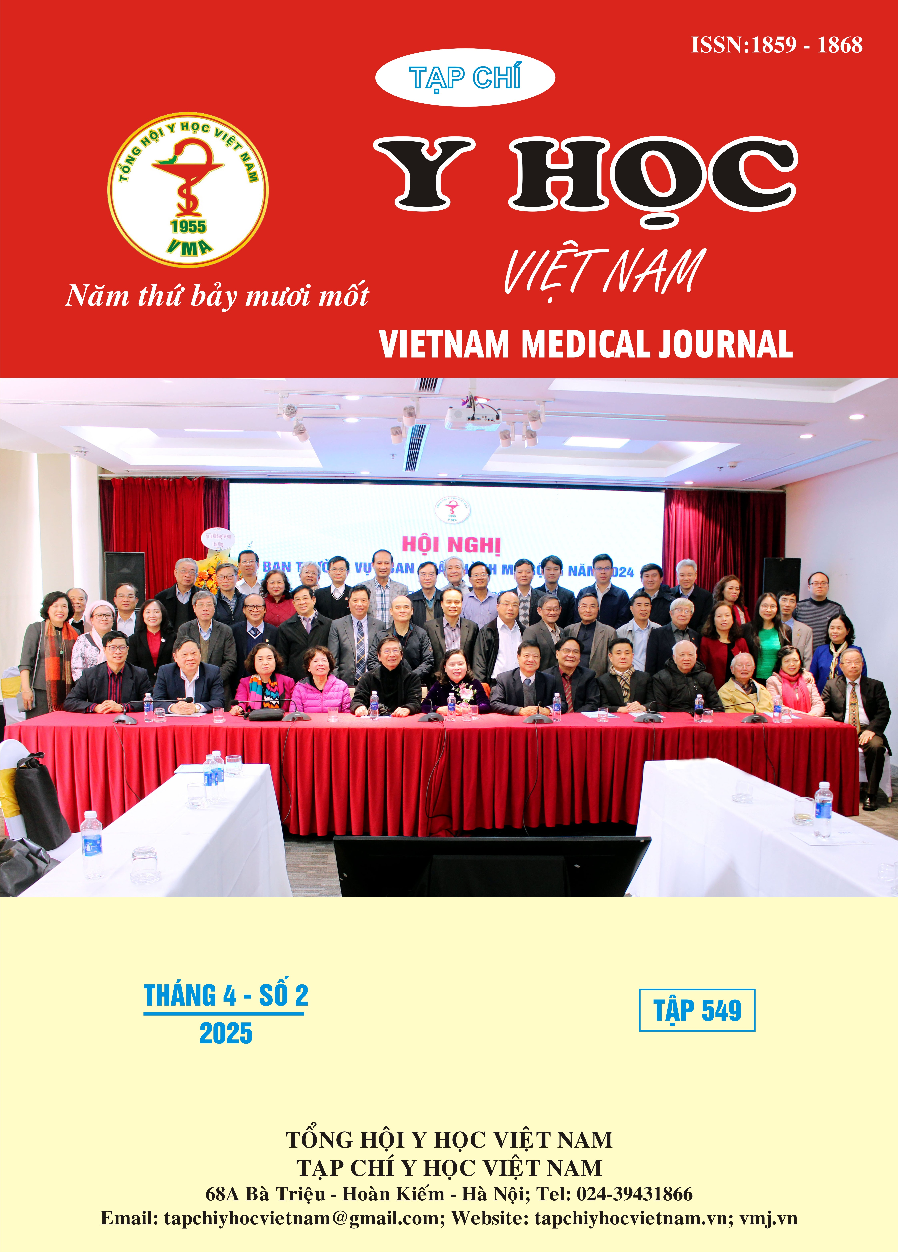KẾT QUẢ ĐIỀU TRỊ UNG THƯ DẠ DÀY BẰNG PHẪU THUẬT KẾT HỢP HÓA CHẤT TRƯỚC MỔ TẠI BỆNH VIỆN K
Nội dung chính của bài viết
Tóm tắt
Mục tiêu: Đánh giá kết quả điều trị của nhóm bệnh nhân ung thư dạ dày giai đoạn muộn được phẫu thuật kết hợp hóa chất trước mổ tại bệnh viện K. Đối tượng và phương pháp: Nghiên cứu mô tả hồi cứu trên 52 bệnh nhân được chẩn đoán ung thư biểu mô dạ dày giai đoạn III- IV không thể phẫu thuật tại thời điểm ban đầu, được điều trị hóa chất tân bổ trợ và được phẫu thuật từ tháng 01/2018 đến tháng 06/ 2023 tại Bệnh viện K. Kết quả: Tuổi trung bình của bệnh nhân là 59,3 tuổi với 53,8% bệnh nhân có độ tuổi từ 40 đến 60, đa số bệnh nhân (73,1%) là nam giới. Các triệu chứng cơ năng thường gặp bao gồm đau bụng thượng vị (80,8%), gầy sút cân (73,1%), chán ăn (51,9%) và nôn, buồn nôn (28,8%). Triệu chứng thực thể gặp chủ yếu là thiếu máu (13,5%), sờ thấy hạch (11,5%), và nôn máu, đi ngoài phân đen (9,6%). Bệnh nhân có tổn thương u ở hang vị chiếm tỉ lệ cao nhất với 73,1%. Kích thước u từ 1-3 cm chiếm đa số với 40,4%, thể loét chiếm tỷ lệ cao nhất 42,3%. Đa số bệnh nhân điều trị bằng phác đồ FLOT, chiếm 90,4%; 5 bệnh nhân điều trị bằng phác đồ XELOX, chiếm 9,6%. Bệnh nhân đáp ứng 1 phần là 98,1%. Có 84,6% bệnh nhân được cắt dạ dày bán phần, 13,5% bệnh nhân cắt toàn bộ dạ dày và 1,9% cắt dạ dày mở rộng. Thời gian sống thêm toàn bộ trung bình là 16,2 tháng. Tỷ lệ sống thêm toàn bộ tại các thời điểm 2 năm và 5 năm lần lượt là 76,9% và 13,5%. Nhóm bệnh nhân di căn hạch N1, N2, N3a có tỷ lệ sống thêm toàn bộ 5 năm tương ứng 27,3%, 10,3% và 8,3%. Sự khác biệt về tỷ lệ sống thêm toàn bộ giữa nhóm N1, N2, N3a là rõ rệt với p <0,05 (p=0,026). Kết luận: Điều trị hóa chất trước mổ giúp kéo dài thời gian sống thêm toàn bộ tăng tỷ lệ phẫu thuật và không làm tăng các biến chứng sau mổ cho bệnh nhân.
Chi tiết bài viết
Từ khóa
ung thư dạ dày, hóa chất tiền phẫu
Tài liệu tham khảo
2. Higuchi K Yamada Y, Nishikawa K, et al. Phase III study comparing và các cộng sự.
3. Luận án tiến sỹ y học, Học viện Quân y. Nguyễn Xuân Kiên (2005). Nghiên cứu một số yếu tố giải phẫu bệnh liên quan đến thời gian sống thêm sau phẫu thuật ung thư dạ dày
4. Trịnh Hồng Sơn. Nghiên cứu nạo vét hạch trong điều trị phẫu thuật ung và Đại học Y Hà Nội; 2001. thư dạ dày.
5. Trần Mai Phương. Đánh giá kết quả điều trị bệnh ung thư dạ dày giai, đoạn muộn bằng phác đồ xelox tại bệnh việN K. Luận văn chuyên khoa và Trường đại học Y Hà Nội; 2020. cấp II.
6. Cuschieri A. Weeden S., Fielding J., Bancewicz J., Craven J., Joypaul V., Sydes M., Fayers P. Patient Survival After D1 and D2 Resections for Gastric Cancer: Long-Term Results of the UK Medical Research Council (MRC) Randomised Surgical Trial. Br. J. Cancer. 1999; 79:1522–1530. .
7. Nguyễn Thị Vượng. Đánh Giá Hiệu Quả Phác Đồ XELOX Trong Điều và Trị Bổ Trợ Ung Thư Dạ Dày. Luận văn thạc sĩ. Đại học Y Hà Nội; 2013.
8. Cai Z. Jiang Z., Yin Y., Shen C., et al. Impact of Surgical Margin Status on the Survival Outcome After Surgical Resection of Gastric Cancer: A Protocol for Systematic Review and Meta-Analysis. BMJ Open. 2020;10:e040282-2020-040282. doi: 10.1136/bmjopen-2020-040282.
9. Kim YW Bang YJ, Yang HK, et al. Adjuvant capecitabine and và các cộng sự.


